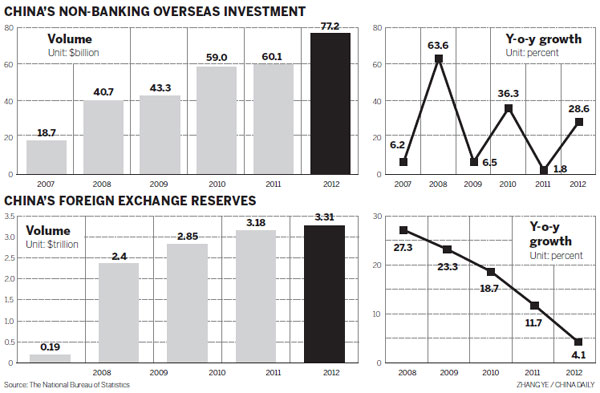Chinese investors eyeing Europe
Updated: 2013-04-15 07:56Emerging markets
Growth in assets under management will be higher in developing Asian markets, including the Chinese mainland, Indonesia, Malaysia and Thailand, than in mature markets such as Singapore, Hong Kong, Taiwan and South Korea, according to a recent study published by Fitch Ratings.
Emerging markets in Asia have a large and growing middle class population with low penetration of managed products at 5 percent of total financial assets on average compared with 15 percent in Western countries, the report said.
Despite the fact China has suffered from a five-year sluggish stock market and an under-developed debt market until recently, analysts believe that a stabilization or rise in equity markets and recent regulatory initiatives to expand Chinese capital markets will allow the gap to be closed during the next few years.
"East Asia represents a growth opportunity for international asset managers but distribution in the region is not straightforward," said Aymeric Poizot, managing director of Fitch's Fund and Asset Manager Rating Group.
"The cross-border wealth management and institutional segments are very competitive while, in retail, large consumer banks dominate distribution in most countries - making distribution agreements critical," said Poizot.
Historically, foreign funds have been distributed in Singapore, Hong Kong, South Korea and Taiwan, notably through private banks, wealth managers or financial advisers. As hubs, Hong Kong and Singapore account for $2 trillion of offshore funds' assets under management, largely consisting of European UCITS funds, the number of which has grown to reach around 6,000 funds in 2012.
China and South Korea dominate the $1 trillion domestic onshore market in East Asia but emerging Asia already accounts for 15 percent of the region's onshore assets under management and continues to grow fast.
"Domestic funds exhibit a bias toward core fixed income products and 2012 flows have continued to favor bond and money market funds. Multi-asset and internationally exposed funds are likely to attract growing flows in the coming years in Asia as in other regions because they offer more diversification," Poizot said.
Investment options
Some European countries are offering more options for fund managers than before.
"In Luxembourg we have various choices to cater to demand from Chinese investors," said Stephane Karolczuk, head of the Hong Kong office of Arendt & Medernach, Luxembourg's largest independent law firm.
In addition to UCITS, the Alternative Investment Fund Managers Directive may enable fund managers to consider other options such as the Specialized Investment Fund, the Undertaking for Collective Investment and the Investment Company in Risk Capital, which provide flexibility to investors, said Karolczuk.
At the same time, China's asset managers are seeking development away from their home country. The long-term strategy is to develop overseas distribution networks.
To be a global player, asset managers need to have their goods exposed widely in the global market and issue products that can be widely accepted, said Nocals Papvoine, a lawyer with the UK-based law firm Allen and Overy.
China's investors need to be exposed to more structured investment vehicles, said Thierry Lohest, a lawyer with the Netherlands-based law firm Loyens and Loeff.
Anyone who reads a Chinese newspaper will be amazed at the large number of property ads but people are inclined to save money in their bank accounts.
"We must persuade people that there are other investment procedures that can bring higher yields but it is not easy at the current stage," said Lohest.
He Wei contributed to this story.

- BYD exports three electric cars to Thailand
- Grid gets first jolt of residential solar power
- US now largest buyer of China's exports
- China's outbound M&As on the rise
- Tobacco control may entail price, tax rises
- Quanzhou becomes pilot financial reform zone
- New automobiles shine at Geneva Motor Show
- World's longest high-speed rail 'on track'
- Jiugui Liquor involved in plasticizer scandal again
- Accident reignites school bus safety concerns
- China to revise labor law
- Trademark registration under scrutiny
- Dinner ban takes toll on liquor firms
- CIC tables bid for London's Chiswick Park
- Property buyers eye overseas market
- Call for law to protect personal information
- China to cut train ticket prices
- Christmas business
- Solar industry to get jolt from new policies
- KFC chicken under spotlight















